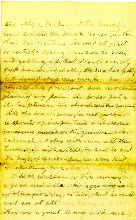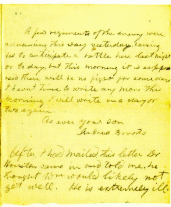Letter to Eleanor Stuart Brooks
Summary:
Andrew Brooks writes to his mother to inform her of
William Brooks' difficult recovery from an illness.
ALS
.pp
July 16, 1861
Andrew Brooks to Eleanor Stuart Brooks, July 16, 1861
Notes
July 16th 1861
Winchester[1]
Dear Ma
Yesterday I wrote
to Charles[2]
telling him of
Williams[3]
sickness and promised to write again
to day or to
morrow. I dont think
he is yet any better. He didnt rest well,
[added: Last night]
not sleeping much, though not so
restless as he has been.
His mind still wanders some but
not so much [added: as] it [deleted: has been done] did
yesterday and [added: the] day
before
The Dr. says he has an
affection
of the spine and through that
affects his brain. He just now
advised me to try and get a private
house to move him to, and promised to go
with me to find one. I think it
will be a great deal better to move [added: him]
if I can. He is here in a room with 5 or
[page 2]
six others Making it too much
crowded and too much noise [added: and] with
their bad breath. He was at first
so restless tossing from side to side
and getting up, that I could scarcely
keep him in bed at all. He now lies quietly
but doesnt sleep very much, has
considerable fever, but does not com
plain of any pain. The Dr. has put
a
blister between his shoulders this morning.
All the medicine, he has given,
is spirits of turpentine and dovers
powders mixed with quinine and
calomel.[4]
I stay with him all the
time, and will, until he can be out
The boys, of our company, are very kind
in assisting me.
Wm Wilson
[5] is this
morning
a good deal better. His eyes were so
swollen for a day or two, that he could
not see at all.
Ther are a great many sick here.
[page 3]
A few regiments of the enemy were
advancing this way yesterday, causing
us to anticipate a battle here last night
or to day, but this morning it is suppos
osed there will be no fight for some days.
[6]
I havent time to write any more this
morning. I will write in a day or
two again.
As ever your son,
Andrew Brooks
After I had mailed this letter
Dr.
Houston came in and told me,
he
thought Wm would
likely not
get well. He is extremely ill.
Notes
[1] It was at Winchester in June of 1861 that the Liberty Hall Volunteers were incorporated into the Army of the Shenandoah as Company I of the 4th Virginia Infantry regiment, commanded by Colonel Thomas J. Jackson. The army drilled for several weeks at Camp Stephens near Martinsburg until General Patterson's Federal army crossed the Potomac. When Patterson occupied Martinsburg, the Army of the Shenandoah fell back to Winchester on July 7th. They remained in Winchester until the 18th, when they were instructed to move towards Manassas Junction to aid General Beauregard in his engagement with the Federals (Bean, 31-37).
[2] Charles Brooks (1839-1920) enlisted in the 4th Virginia Infantry, Co. I on July 7, 1861. He was perhaps en route to join the company in Winchester (Robertson, Fourth Virginia Infantry, 41).
[3] William Brooks (1838-1861) enlisted in the 4th Virginia Infantry, Co. I with Andrew in June of 1861 (Robertson, Fourth Virginia Infantry, 41). He became quite ill sometime in early July of that same year. In a letter to James Brooks also dated July 16, 1861, Captain White reports that William passed away due to "congestion of the brain." See White's letter to James Brooks, July 16, 1861.
[4] Quinine, an antiperiodic drug, was often dissolved in whiskey and used against malaria. Calomel is a mercury compound. (Freemon, 8-9).
[5] William Wilson (1843-?) enlisted in Co. I on June 2, 1861. He was also a student at Washington College. Captured at Kernstown on March 23, 1862 (as was Andrew Brooks), he was exchanged on Aug 5, 1862. Wilson was reported as a deserter on Nov. 27, 1862 (Robertson, Fourth Virginia Infantry, 41).
[6] The troops stationed at Winchester were impatiently waiting for Patterson to advance (Robertson, Fourth Virginia Infantry, 33); however, on July 18, they received orders to evacuate Winchester and travel eastward through the Blue Ridge Mountains towards Manassas to serve as reinforcements in the defense of the Railroad Junction. On July 21, the First Battle of Manassas was fought. The 4th VA was pivotal in the counterattack which carried the battle, yet sustained the highest losses of any of the regiments in the brigade: 31 dead and 100 wounded. Besides its role as an important victory for the Confederates, the First Manassas gave birth to two Confederate legends: the "Rebel Yell," and Jackson's nickname—credited to South Carolina General Barnard Bee who, upon perceiving Jackson's brigade behind him, shouted to his troops, "Look, men! There stands Jackson like a stone wall! Rally behind the Virginians!" (Robertson, Fourth Virginia Infantry, 5-7).
Works Cited
Bean, W. G. The Liberty Hall Volunteers: Stonewall's College Boys. Charlottesville: The University of Virginia Press, 1964.
"The Civil War Artillery Page" http://www.lib.uchicago.edu/~cjt1/artillery.html. Chuck Ten Brink. Visited April, 1998
Crenshaw, Ollinger. General Lee's College: The Rise and Growth of Washington and Lee University. NY: Random House, 1969.
Denney, Robert E. The Civil War Years: A Day-by-Day Chronicle of the Life of a Nation. NY: Sterling Publishing Co, Inc., 1992.
Driver, Robert. J. 52nd Virginia Infantry. Lynchburg, Va: H. E. Howard, 1986.
Freemon, Frank. Microbes and Minie Balls. London: Associated University Presses, 1993.
Lankford, Nelson D. "Alexander Robinson Boteler." Encylopedia of the Confederacy. Ed. Richard N. Current. NY: Simon & Schuster, 1993. I: 197-8.
McMurry, Richard. M. "Joseph E. Johnston." Encylopedia of the Confederacy. Ed. Richard N. Current. NY: Simon & Schuster, 1993. II: 859-61.
McPherson, James M. The Atlas of the Civil War. New York: Macmillan, 1994.
Robertson, James. 4th Virginia Infantry. Lynchburg, Va.: H.E. Howard, 1982.
—. The Stonewall Brigade. Baton Rouge: Louisiana State University Press, 1963.
Sublett, Charles W. 57th Virginia Infantry. Lynchburg, Va.: H. E. Howard, 1985.
Turner, Charles W. Old Zeus: Life and Letters (1860-'62) of James J. White (Professor of Greek at Washington College 1852-1893, Captain of the Liberty Hall Volunteers 1861-'62). Verona, VA: McClure Printing Company, Inc., 1983.
Wallace, Lee A. 5th Virginia Infantry. Lynchburg, Va.: H. E. Howard, 1988.

